
As a lucrative form of business, dropshipping has become increasingly popular among both beginner and seasoned e-commerce entrepreneurs. A reliable side hustle for some and a stable source of full-time income for others, many e-commerce professionals are adopting dropshipping as a form of business.
With its recent popularity, some beginner e-commerce entrepreneurs concerned about dropshipping legal requirements are also asking the question, “is dropshipping illegal?”
In this article, we’ll explain why dropshipping is a legal and legitimate form of business while also investigating dropshipping legal requirements and recommendations.
Legal Disclaimer: All information provided in this article is for educational purposes only and from the perspective of the publisher and author. This article does not constitute legal advice or propose any legal recommendations. The publisher and author of this content do not assume any legal liability. Contact an attorney when seeking counsel on important legal decisions.
What is dropshipping?
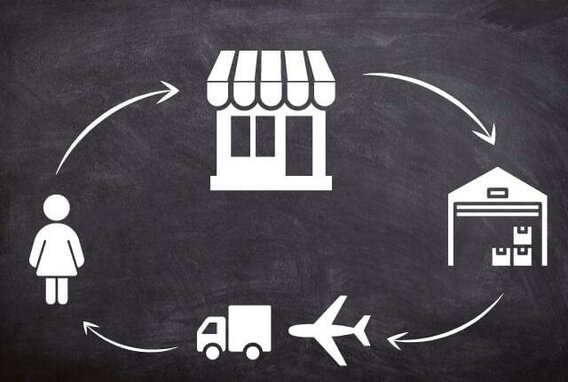
Before delving into dropshipping legal requirements, we will first address what dropshipping is as a form of business.
Dropshipping is a method of order fulfillment where businesses rely on suppliers to ship orders to customers so that the business never has to keep any inventory.
Essentially, a business receives an order from a customer and passes this order on to a supplier to deliver the item to the customer. The supplier will receive the order from the business and will oversee the delivery of the order to the customer.
This form of fulfillment frees the business from having to hold any inventory, as the suppliers hold the product and are responsible for shipping the product to the customers.
Since the business is free from worrying about any inventory, they can instead focus their efforts on marketing, advertisement, and generating online orders. This makes dropshipping a great form of business but can create some misunderstandings regarding dropshipping legal requirements.
Is dropshipping legal?

For beginner e-commerce entrepreneurs asking, “is dropshipping legal?” the answer is absolutely! As a method of connecting customers with suppliers, dropshipping is certainly legal. Many online stores utilize some form of dropshipping, including major online stores like Amazon.
For online stores, dropshipping is important to make sure customer orders are fulfilled and customers receive what they’ve purchased. Dropshipping helps suppliers and vendors increase their profit as another form of marketing products and fulfilling e-commerce sales, so there’s nothing inherently illegal about dropshipping.
Although dropshipping is not illegal, e-commerce entrepreneurs need to consider dropshipping legal requirements. There are legalities governing this form of business that must be adhered to and respected.
Protecting your business from legal liability is important if you're running a dropshipping business. Breaking any legal requirements or promoting any bad practices can seriously damage your dropshipping business.
What are dropshipping legal requirements?
There are a few legal requirements e-commerce entrepreneurs need to be aware of when asking, “is dropshipping legal?” Dropshipping legal requirements exist to protect business owners, suppliers, and customers.
You must know dropshipping legal requirements and make sure your business follows them, as they will shield you from liability. Adhering to these requirements also gives your business legitimacy, which is important for developing agreements with suppliers and building relationships with customers.
Paying Taxes

As the owner of a dropshipping business, you will be legally obligated to pay taxes, including income tax and (in some situations) sales tax.
Income tax will need to be paid on the profit the store makes each year, as this is considered the store’s annual income. Like paying a tax on personal wages from a job, income tax will be paid depending on the amount of profit made in a year.
This tax will always be paid to the local government, regardless of where customers or suppliers are located. For example, if you are located in the United States, you will pay income tax to the United States federal government. For entrepreneurs located in the United States specifically, income tax will also be paid to the respective state government.
In the United States, a sales tax will normally be imposed on the customer (the end-user or consumer of the product). Typically, the dropshipping business owner does not pay sales tax on any products being dropshipped, as these products are purchased for resale purposes, and the owner has an authentic exemption certificate.
An exemption certificate is a dropshipping legal requirement that will exempt your business from paying sales taxes. These certificates are issued by states and are used when a product is purchased from a supplier to resell to customers.
When forming an authorization agreement for dropshipping with a supplier, the supplier will generally require you to provide proof of having an exemption certificate.
As a business owner, you will normally only be required to collect and pay a sales tax if the customer resides in the same state as you.
Laws regarding sales tax differ for e-commerce entrepreneurs based in other countries, such as Canada or the European Union. Make sure to research the sales tax legislation for your country to see how it varies.
Having a Privacy Policy

For most countries and states, having a privacy policy in place is an undisputed dropshipping legal requirement. As an e-commerce business, customers' personal information will be collected throughout completing transactions.
While doing business with a customer, any order placed can include the customer's contact information, banking information, credit card information, or home address.
A privacy policy is not only a legal requirement but also protects your business from any legal liability as you collect personally identifiable information.
Publishing a clear and transparent privacy policy will also boost customer faith in your business, as it shows you are concerned about their privacy and interested in protecting their information.
Adhering to Anti-Spam Laws

While anti-spam laws differ between countries, it is important to ensure you are marketing your store legally, especially via email.
Emails are heavily protected by anti-spam laws, and any e-commerce entrepreneur should avoid breaking these laws to prevent any negative effects on the reputation of the business.
When emailing out newsletters or offers to generate purchases, make sure customers are given the chance to opt-in. Ensure you are not using false information and identify the email as an advertisement.
Having an option for customers to opt-out of any emails is another legal requirement. If some of your customers opt out, make sure they are taken off of your email list right away, as a legal dispute could be opened if they continue to receive emails.
What are dropshipping legal recommendations?
While the following items are not dropshipping legal requirements, they are highly recommended for e-commerce entrepreneurs who want to make their dropshipping business as legitimate and legally consistent as possible.
These recommendations exist to protect everyone involved in dropshipping operations.
Obtaining a Business License
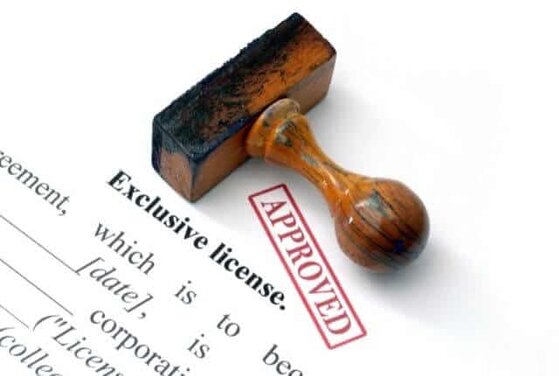
For e-commerce entrepreneurs asking, “am I required to have a business license?” the answer is technically no.
While not necessarily a dropshipping legal requirement, obtaining a business license can still help protect you – and would be a great starting point for your new dropshipping business.
Different countries have varying types of licenses and registrations. Make sure to conduct diligent research in evaluating the type of license you wish to obtain.
Having a license will increase the legitimacy of your operation, which can help when building relationships with suppliers. Providing proof of a license shows suppliers and customers alike that you are a trustworthy and reliable entrepreneur and that your dropshipping business is dependable and honest.
Having a licensed business can also help separate and organize your business's financial activity from your own. So, although this is not a dropshipping legal requirement, it is highly recommended!
Developing a Refund Policy
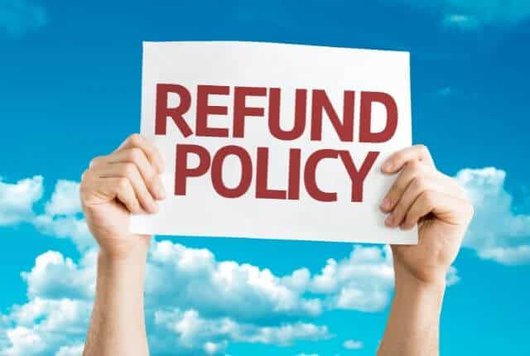
As the owner of your store, you are the one who decides what policies your store will adhere to! For building strong customer relationships and demonstrating your business is dependable, having a refund policy is a popular dropshipping legal recommendation.
Refunds are not a common occurrence, but special cases do arise, and it is important to have a policy prepared to handle these cases and potentially protect your business.
By making your refund policy clear and accessible, customers will have more trust in placing their orders. If a refund situation arises, you and the customer will have a roadmap to follow. Should you have to deal with a frustrated customer, you will be happy you developed a policy!
Operating without a refund policy is risky. Any potential customer could dispute your lack of a refund policy, which can tarnish the reputation of your business. Having a damaged reputation will hurt your business with future suppliers or customers.
Protecting yourself with a refund policy that is clear and understandable protects your business and your customers. This is a win-win scenario and makes your dropshipping business reliable.
Developing Terms and Conditions
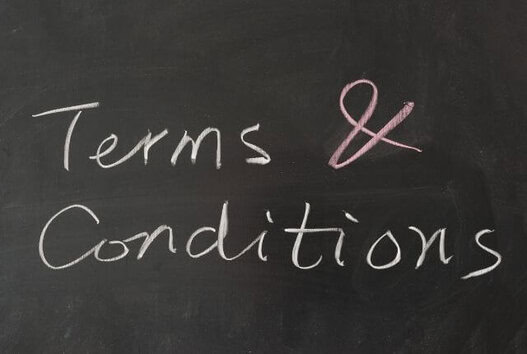
Just like a refund policy, having clear terms and conditions will help protect your dropshipping business and promote trust in your business amongst potential customers.
While not a legal requirement for dropshipping, terms and conditions will inform customers of how to conduct business with you, such as how orders are processed, how to make returns, or how to access and utilize your online store.
These terms and conditions also provide grounds to terminate business with any bad actors or prevent individuals from using your website for unlawful or potentially harmful purposes. Since your dropshipping business will be accessible on the internet, protecting your business and customers from any deviant behavior is important.
Dropshipping legal requirements: What are illegal dropshipping actions?
When asking, “is dropshipping illegal?” some actions are illegal and should be avoided by any e-commerce entrepreneur.
Dropshipping Unauthorized Products

Before arranging for product dropshipping, an e-commerce entrepreneur needs to first obtain authorization from the supplier or manufacturer of that product.
Building a strong business relationship with a supplier or manufacturer is incredibly important. Without authorization to sell a product, your dropshipping business can be sued by an already established brand, which could cause you to pay costly legal fees – especially for popular products from prominent brands.
Obtaining authorization first to drop ship a product can protect you from any legal concerns here. Contact the suppliers and brands for the products you want to dropship that may be subject to trademark protection and ask about creating a dropshipping agreement with them.
This will make you an authorized dropshipper with that supplier and will protect you from any claims of unauthorized dropshipping of products.
Specifically, avoid dropshipping any trademarked or copyrighted products without authorization, as sales of these items will be considered intellectual property sales and could be considered intellectual property theft.
Dropshipping Counterfeit Products
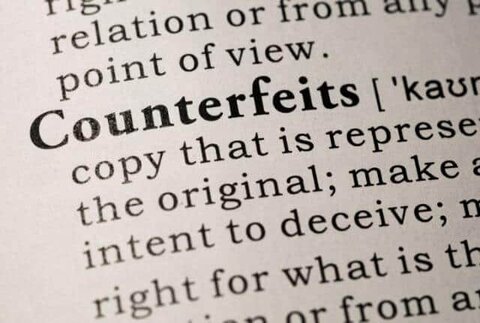
An illegal dropshipping practice is listing a counterfeit product on your store as the real product. Dropshipping a fake product can cause your store to be sued, fined, or ultimately shut down (even if it was not intentional).
Selling inauthentic products damages relationships with suppliers and can severely hurt any future agreements with suppliers. But above all, you risk legal actions from the brands that created these products.
Make sure you are working with legitimate suppliers to avoid any legal consequences of misrepresenting and dropshipping counterfeit products. Make sure to research your products and suppliers.
If you believe you have listed a fake product, take the listing down immediately. But above all, you risk legal actions from the brands that created these products.
Dropshipping Prohibited Products

Dropshipping is illegal for certain products, and e-commerce entrepreneurs should avoid dropshipping these types of products. Dropshipping prohibited products could make you subject to legal prosecution or costly fines.
Some common products prohibited from dropshipping include animals, certain drugs, weapons, toxic substances, plants, and anything including pornographic material.
Make sure products you wish to dropship are legally permitted to be dropshipped and that you have all of the authorizations necessary to dropship them. Some products have only partial restrictions on dropshipping, so make sure you’ve done your research into what these partial restrictions are.
Dropshipping legal requirements: so, dropshipping is legal?
Unequivocally, yes! A growing form of e-commerce, dropshipping is unmistakably legal, legitimate, and permittable. When starting your dropshipping business, make sure you are well-versed in the dropshipping legal requirements listed above to make your e-commerce business as attractive and legally compliant as possible.
Being a legally proactive business and having policies your store follows will demonstrate to your customers you mean business! They will be much more inclined to place orders through your store, and suppliers will feel much more confident conducting business with you.
In an e-commerce environment where driving traffic to your store is paramount, making sure you follow dropshipping legal requirements is critical.
References:
- USPTO – United States Patent and Trademark Office
- SBA – U.S. Small Business Administration: Apply for licenses and permits
- Amazon: What is dropshipping, and how does it work?
- Dropshipping and Sales Tax: who collects, who pays?
- Federal Trade Commission – CAN-SPAM Act: a compliance guide for business
- Federal Trade Commission – Protecting Consumer Privacy and Security
- NCSL, National Conference of State Legislatures: State Laws Related to Digital Privacy
